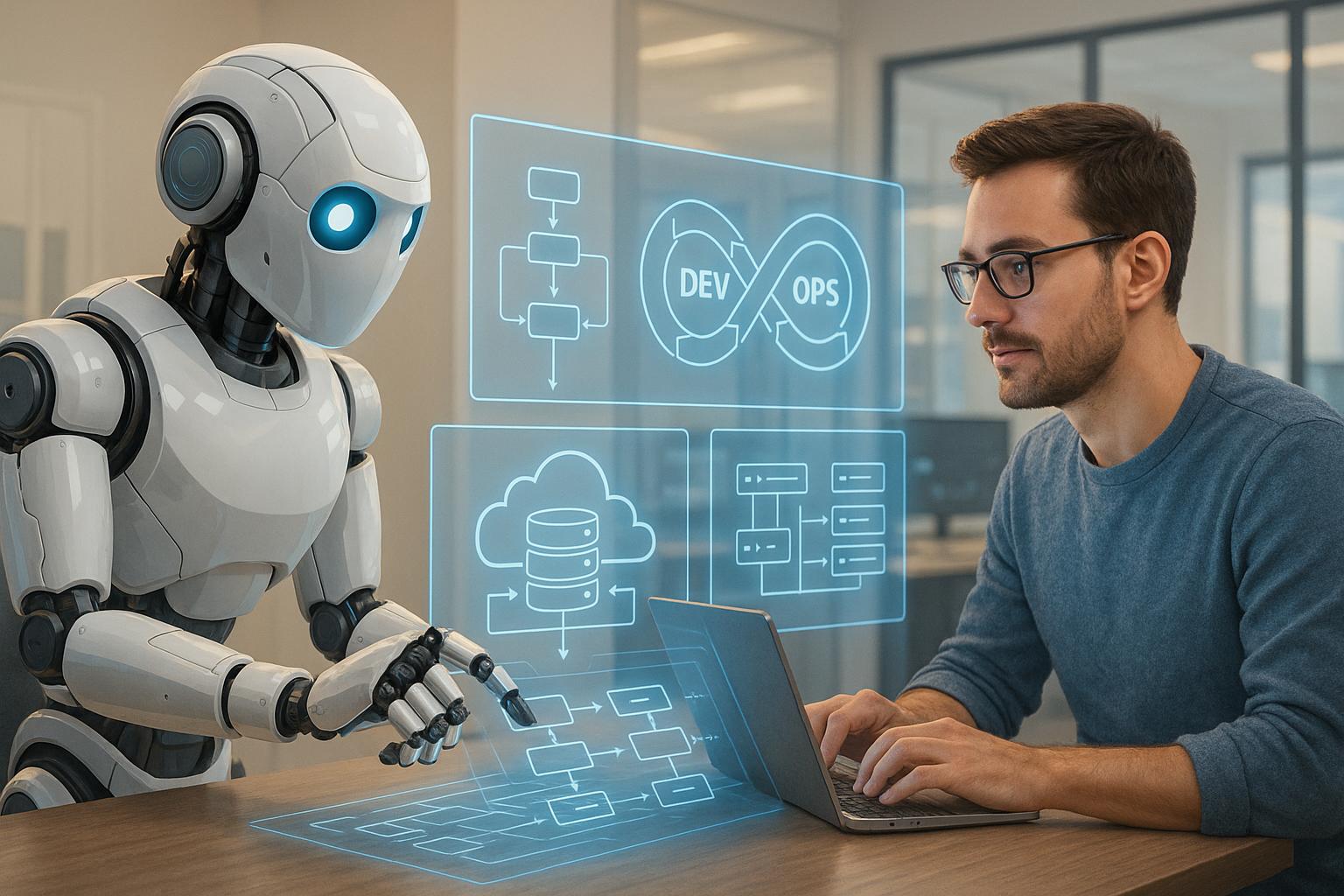The world of DevOps is at a critical inflection point. Artificial intelligence (AI) is no longer a distant possibility; it has become a transformative force, reshaping how software is developed, delivered, and maintained. At this year’s GitCon conference, Nathan Harvey, a leading voice from Google Cloud and head of DORA (DevOps Research and Assessment), delivered an insightful keynote outlining how AI is driving seismic shifts in DevOps practices.
This article breaks down the highlights of his presentation, exploring how organisations can adapt to AI's potential while addressing challenges that come with this evolution. Whether you're a CTO of a SaaS startup, an IT manager in e-commerce, or an infrastructure specialist in an established enterprise, this analysis will provide actionable insights for leveraging AI in your DevOps strategy.
The Evolution of DevOps: Lessons from DORA’s Decade of Research

To understand how AI fits into DevOps, it’s essential to first grasp the foundations laid by DORA, which Nathan Harvey highlighted as a cornerstone in improving technology-driven organisations. Since 2014, DORA’s annual reports have analysed the critical factors driving high-performing software delivery teams.
Key findings from DORA’s work over the past decade include:
- Job satisfaction drives performance: Teams with happy, engaged developers deliver higher organisational performance.
- Elite teams deploy faster and fail less: Top-performing teams deploy code 30x more often with 50% fewer failures.
- Collaboration and culture matter: Inclusive, generative cultures prevent burnout and foster continuous improvement.
- Cloud adoption accelerates success: Teams that embrace essential cloud characteristics are 23x more likely to become elite performers.
These principles remain relevant in today’s AI-driven era, but they must now be re-examined through the lens of rapidly evolving technologies.
AI’s Entry into DevOps: A Paradigm Shift
The Rise of AI Adoption
Artificial intelligence is no longer a fringe phenomenon. According to DORA’s latest studies, the majority of organisations are actively integrating AI into their software development processes. Competitive pressures and the need to stay ahead are driving this adoption, with AI now being utilised for:
- Code generation and summarisation: Automating repetitive tasks so developers can focus on innovation.
- Improving developer experience: Enhancing job satisfaction by reducing mundane work, boosting productivity, and enabling a state of
flow
.
However, as Harvey emphasised, AI is not without its challenges. While 70% of respondents in DORA’s research observed productivity gains, trust in AI-generated code remains a hurdle, with nearly 40% of developers expressing hesitation.
The Productivity Paradox in AI Adoption
AI’s impact on productivity is nuanced. On one hand, developers report improved flow and satisfaction; on the other, there appears to be a reduction in time spent on what respondents consider valuable work
. This paradox may stem from AI’s ability to expedite tasks but not necessarily eliminate toilsome activities like internal bureaucracy or repetitive manual processes.
The Challenge of Stability
Perhaps the most striking insight from DORA’s research is the detrimental effect of AI on overall software delivery stability. While AI enables faster throughput, stability metrics, such as change failure rates, have declined by over 7%. This may be attributed to larger change sets generated by AI, which are harder to manage and test comprehensively, violating one of DORA’s core principles: shipping smaller, incremental changes for better reliability.
Embracing AI Without Compromising DevOps Principles
Nathan Harvey provided several practical recommendations for organisations looking to harness AI’s potential while avoiding its pitfalls.
1. Establish Clear AI Usage Policies
One of the first steps in AI adoption is ensuring clarity around how AI tools will be used within the development team. Policies should address intellectual property safeguards, ethical considerations, and acceptable use cases for generative AI. A transparent framework builds trust among developers and reduces uncertainty.
2. Reinforce High-Quality Feedback Systems
AI can amplify the velocity of code development, but this makes robust feedback loops even more critical. Organisations should invest in automated testing, continuous integration, and code reviews to ensure that faster development cycles don’t compromise code quality.
3. Provide Training and Exposure to AI
Trust in AI grows through use and familiarity. Leaders should encourage developers to engage with AI tools, experiment with prompts, and gain hands-on experience. Training programmes can enhance developers’ ability to optimise their interactions with AI, leading to better outcomes.
4. Focus on Eliminating Toil
While AI has improved some aspects of the workflow, it has yet to significantly reduce toilsome work, such as addressing technical debt or bureaucratic processes. Leaders should prioritise automating these areas to unlock more time for creative, high-value tasks.
5. Encourage, Don’t Force, AI Adoption
Change is most effective when it’s embraced willingly. Forcing developers to rely on AI tools can backfire, creating resistance. Instead, organisations should highlight AI’s benefits and allow teams to integrate it at their own pace.
6. Rethink the Developer’s Role in an AI-Driven World
AI will not replace developers, but it will redefine their roles. Teams should explore how AI can serve as a collaborative partner, enabling developers to focus on strategic and innovative work rather than routine tasks.
AI’s Impact on Software Delivery Metrics
One of the most significant areas explored in DORA’s research is the relationship between AI and software delivery performance. Using metrics like lead time, deployment frequency, and change failure rates, DORA has long demonstrated how elite teams outperform their peers by orders of magnitude.
However, the introduction of AI has disrupted this balance. While productivity has improved for individuals, the broader organisational metrics show mixed results, particularly in throughput and stability. This underscores the importance of aligning AI adoption with DevOps best practices, such as small batch sizes and continuous feedback.
Key Takeaways
For UK businesses looking to integrate AI into their DevOps and software delivery pipelines, here are the most actionable insights:
- AI is here to stay: Over 70% of developers report productivity gains from AI adoption.
- Trust is still a barrier: Nearly 40% of developers express low trust in AI-generated code. Clear policies and training can improve trust.
- Smaller changes remain crucial: AI-generated larger change sets can harm stability metrics like deployment failure rates. Keep changes manageable for better results.
- Focus on feedback: Strong automated testing and rapid feedback loops are essential to maintain code quality in an AI-driven environment.
- AI doesn’t eliminate toil (yet): Organisations should explore ways to use AI for reducing repetitive and bureaucratic tasks.
- Developer roles will evolve: AI isn’t replacing developers but redefining their focus toward more strategic, creative work.
- Start with clear policies: Ensure a transparent framework for acceptable AI use in your organisation.
- Adopt AI incrementally: Encourage experimentation without forcing adoption on hesitant teams.
Conclusion
AI has the potential to revolutionise DevOps and software delivery, but its adoption must be approached thoughtfully. By aligning AI capabilities with established principles of high-performing DevOps teams, organisations can unlock productivity gains without compromising stability or reliability.
For UK-based businesses navigating rising operational costs and the demand for faster system deployments, these insights provide a roadmap to harnessing AI’s transformative benefits. The challenge is not just integrating AI but doing so in a way that enhances performance, fosters trust, and creates a sustainable future for developers and organisations alike.
As the DORA research highlights, the best teams are those that continually strive to get better at getting better.
By combining AI with a culture of learning, collaboration, and innovation, your DevOps team can lead the way in this next era of technological evolution.
Source: How AI Is Reshaping DevOps & Software Delivery
- GitKraken, YouTube, Aug 25, 2025 - https://www.youtube.com/watch?v=mCxf0ZlO6pg
Use: Embedded for reference. Brief quotes used for commentary/review.
